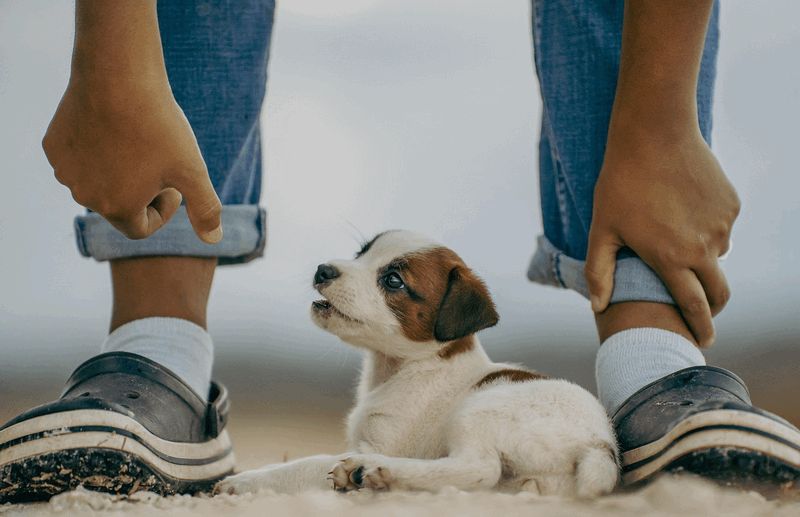Puppy Love: Understanding Puppy Behavior & Recognizing When Training is Needed

Getting a new puppy is an exciting time! Much like bringing home a new baby, new puppy owners are a mix of excitement, anticipation, and nervousness. And also, much like bringing home a new baby, you’re never really that prepared for the little things that will feel like very big things. Puppy behavior changes quickly, with each developmental stage bringing new behaviors. These developmental stages may worry new puppy parents. One minute your little Fido is sleeping peacefully, and the next he’s chewed up your $427 pair of limited sneakers.
Having a new puppy is almost like negotiating with a very cute, tiny, and mostly innocent terrorist. It’s sometimes hard to know when puppy behavior is normal, and when you need to train your puppy to correct unwanted behavior. Puppies are rapidly learning about the world around them, and while certain things are normal, other things will need puppy training.
But how can you tell? Read more to learn about puppy behavior and when dog training is needed.
Puppy Development Stages: Quick View
Newborn to 4 Weeks Old
For around the first three weeks of a puppy’s life, their senses haven’t started working. They can’t see, hear, or even smell yet. In fact, these cute balls of fluff will spend most of their time sleeping.
By four weeks, a puppy should be able to walk and may even start to bark or wag their tail. By this time, they should also start to relieve themselves without mother’s stimulation. This is also the time that those tiny, sharp raptor teeth will appear.
4 to 8 Weeks
This is some of the busiest times of a puppy’s life. They’re being weaned, and mom is starting to teach them how to dog. A puppy this old should play with their siblings and begin to explore. At this point, they have a high fear threshold (leaving this for you to worry about) and should be gently exposed to stimuli within their environment.
By the eight-week mark, many puppies are ready to go to their permanent home. They’ve often matured enough to adjust to a new environment and still have a high fear threshold.
8 to 12 Weeks
This is the period where puppies usually suddenly develop a sense of fear. Puppies this age are at their most impressionable, and positive experiences help them adjust to their new environment. This is the time to expose your puppy to new people, animals, and situations that you believe they can handle.
Much like young children, puppies are like sponges and soak up information and experiences. Also, like young children, try to avoid frightening and painful experiences as much as possible. When they do happen, try to add extra praise, and avoid overreacting. Respond positively to help relieve puppy fears during less-than-ideal situations.
This is also the time when most puppies begin to form strong bonds to their people, relationships that will last a lifetime.
12 to 24 Weeks
At 12 weeks old, your puppy is less fearful and is becoming more curious. Much like a preteen, they’re striving for independence while stumbling as they do. They have a lot to figure out, including their place in the family. Personality traits such as dominance emerge as they learn more social skills.
Their permanent teeth are also starting to emerge, which means a lot chewing, and a lot of patience required. Because chewing is a natural behavior during this stage, it’s important to provide plenty of chew toys.
By 16 weeks, your puppy is probably ready to go to school. This is a great time to sign your puppy up for dog obedience or puppy training classes, like what Next Step K9 offers. This is a great time to learn how to help your puppy behave. It’s important that both you and the puppy gain some tools and new skills during this time. During this developmental stage, puppies can be house broken, while also learning basic commands and obedience. It’s also important to keep up with your puppy’s socialization efforts. By exposing your puppy to new things in a controlled setting, you’ll help them feel secure, allowing them to develop confidence.
6 to 12 Months
Your adorable puppy has now turned into a teenager, and you’re probably noticing that things are getting…interesting. At this age, dogs will begin to test boundaries more, and many will try to assert themselves. They may challenge their humans and other household pets.
Puppies/dogs of this age need plenty of stimulation and activity. Their boredom threshold is very similar to a young teen’s. This means that you can almost certainly expect some mischief and disobedience.
This is an important time to keep up training, or to enroll your puppy if you haven’t. This is a great time to combine good leash manners with other extensive training methods.
12 to 18 Months
By this age, your puppy is no longer really a puppy. Dogs usually reach emotional maturity by 12-18 months and have the temperament that they’ll have throughout adulthood. Generally, smaller breeds often mature sooner, and larger breeds often take a bit longer to reach emotional and physical maturity. Be sure to continue training and sign up for refreshers as needed or wanted.
You’ve spent a lot of time preparing your puppy for this time. However, it’s important to keep up training and bonding.
Puppy Behavior: Normal VS. Abnormal
Now that you’ve learned about the developmental stages of your puppy, its important to learn about puppy behavior and what could be normal for your puppy to go through.
Normal Behaviors
- Chewing- This is a frequent, teething-driven behavior that’s normal in puppies. However, as an adult, this behavior can be rare and can be a byproduct of boredom.
- Barking- This is normal behavior for a puppy that signals play and attention seeking. As an adult dog, barking can be a sign of territorial boundaries or to alert their humans or other animals.
- High Energy- Puppies are often high energy, coming in bursts. If your puppy is consistently lethargic, a vet visit may be in order.
- Exploration through mouthing and chewing.
- Frequent bathroom needs, every 2 -3 hours or so.
- Social, mostly gentle play with other people and dogs
- Slight growling, barking, etc. This is true especially during play or high stimulation times.
Abnormal Behaviors
- Frequently expressed anxiety.
- Food aggression, especially if trained already
- Indoor potty use, if trained already.
- Lethargy and poor appetite
- Aggression that is outside the normal or expected.
- Frequent urination or defecation, outside normal or expected frequency.
- Biting, especially outside of play.
- Separation anxiety
- Persistent fear or anxiety
- Any risky behavior
Defining normal vs abnormal behavior for a puppy or young dog isn’t always cut and dry. It’s important to form a close bond with your puppy, so that you’re better able to identify when things are out of commonplace for them. It’s important to begin training your puppy as soon as they are old enough to, as this will not only help form a special bond between you and your dog, allowing you to recognize behavioral patterns.
By better understanding your puppy’s behavior and responding accordingly, you’re setting you and your puppy up or a life of contentment and happiness in their new home with you. That’s something to wag your tail about!
Need extra help identifying when your puppy needs training? Looking for training sessions that actually work? Contact us today!
